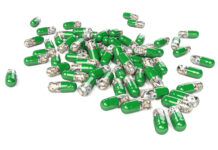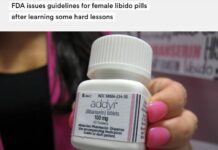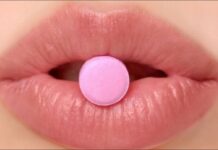On Tuesday, the U.S. Food and Drug Administration (FDA) approved Flibanserin (Addyi) to treat low sexual desire in women despite concerns about the drug’s limited efficacy and doubts over its clinical relevance. That the drug is being called the “pink Viagra” can be misleading as Viagra treats erectile dysfunction by improving blood flow while Flibanserin targets the brain, and must be taken daily.
Flibanserin was initially developed as an antidepressant, but it failed to demonstrate a significant effect over placebo. It is now being offered by Sprout Pharmaceuticals as a treatment for hypoactive sexual desire disorder (HSDD), defined as “persistently or recurrently deficient or absent sexual fantasies and desire for sexual activity,” leading to distress and interpersonal difficulties. Critics have challenged the validity of the HSDD diagnosis, calling it a “textbook case of disease mongering by the pharmaceutical industry.”
Opponents have also contended that the potential side effects outweigh the modest effects. Studies reported that women taking the drug experienced one more sexually satisfying event per month while the most common short-term side effects include drowsiness, dizziness, and fainting. There is also the potential for adverse effects when flibanserin is taken with alcohol or oral contraceptives.
This week Mad in America featured an Op-Ed by three doctoral students at UMass Boston which describes the ways in which “disease mongering,” conflicts of interest, and commercialization contributed to the creation and approval of Flibanserin. Read it here →















This is just despicable–the LA Time had a piece with this ‘news’ (sounded like an ad) and the comments were enough to crush whatever hope I had that progress was being made.
Report comment
It sounds like the drug may be similar in action to Wellbutrin, which I know from personal experience can cause increased libido – although this and the other side and withdrawal effects from Wellbutrin also get misdiagnosed by psychiatrists as “bipolar,” which of course results in a living nightmare.
There are lots of other patients talking about increased libido as a side effect of Wellbutrin when you google “Wellbutrin increased libido,” too. But when I googled “Flibanserin increased libido” I didn’t find any patients claiming this drug increases libido in the first ten pages of the Google search.
Anyone know how similar these two antidepressants are?
Report comment
From Wikipedia:
Wellbutrin (bupropion):
– weak norepinephrine-dopamine reuptake inhibitor (NDRI)
– also been found to act as a releasing agent of dopamine and norepinephrine (NDRA)
– converted in the body into several active metabolites with differing activity and influence on the effects of bupropion during first-pass metabolism
– also known to act as a non-competitive antagonist of the α3β2, α3β4, α4β2, and, very weakly, α7 nACh receptors
In other words hell knows how it works (except that it has some effect on at least dopamine and norepinephrin).
Flibanserin:
– a full agonist of the 5-HT1A receptor (Ki = 1 nM) and, with lower affinity, as an antagonist of the 5-HT2A receptor (Ki = 49 nM) and antagonist or very weak partial agonist of the D4 receptor (Ki = 4–24 nM)
– occupies the 5-HT1A and 5-HT2A receptors in vivo with similar percentages
– has low affinity for the 5-HT2B receptor (Ki = 89.3 nM) and the 5-HT2C receptor (Ki = 88.3 nM), both of which it behaves as an antagonist of
– found to increase dopamine and norepinephrine levels and decrease serotonin levels in the rat prefrontal cortex, actions that were determined to be mediated by activation of the 5-HT1A receptor.[11] As such, flibanserin has been described as a norepinephrine-dopamine disinhibitor (NDDI).
In other words does something to serotonin signalling plus screws up norepinephrine and dopamine – seemingly in the same direction as Wellbutrin (up) so you may be onto something here.
Report comment
Another disaster…
Report comment
And isn’t it convenient for the drug company that makes it that it must be taken daily????!!!!!!!
Report comment
The FDA has sold us down the river!
Report comment
Lots of people really hate this drug, but I don’t see a big problem.
1. “It’s disease mongering” – Sure, but regulatory pathways in the United States and every other major country require that a new drug treat a “disease or condition”. In principle there is nothing wrong that I can see with developing a drug that helps people enjoy sex or have more orgasms, but you can’t get such a drug approved unless it is positioned as correcting some sort of deficit. “Disease mongering” in this case is a rational response to an irrational regulatory regime that requires the existence of a “disease” as a prerequisite for drug approval. Drugs that enhance life are simply not recognized.
2. “It’s a recycled, failed antidepressant”. Who cares? Viagra is a recycled, failed heart medication. It works just fine and allows hundreds of thousands of couples to have better sex.
3. “It barely works and has side effects”. This is probably the only objection I’ve seen that holds water. But as individuals, people will place different values on an additional “sexual satisfying event” per month, so its hard to set a risk-benefit ratio that is applicable to everyone. Why not let women make their own decisions as individuals?
4. “Pharma will make billions off a drug that hardly does anything”. Experience shows that people generally stop taking drugs very rapidly unless they experience some benefit that they find meaningful. While I am speculating here, I think this drug will likely be just as much a commercial flop as the once highly hyped antiobesity drugs approved in 2011 that never achieved sales >10% of the original market estimates.
JMHO.
Report comment
1. No that makes a big difference. The same as treating stimulants as performance enhancing drugs as opposed to meds treating “ADHD”. The difference is between telling people: here’s a pill that may or may not enhance your performance (in exchange for such and such risk of side effects) and telling them they are sick, defective and abnormal. Which disease mongering is. It takes benign, normal problems of living (which are often created by underlying problems like emotional issues in a marriage, work stress, unhealthy lifestyle etc.) and turns them into an illness that needs medical attention. That is a huge difference and it is lying to people and it is extremely harmful.
3. The effects of this drug are overblown (this +1 good sex in a month comes from pharma’s “research” which we know very well rarely plays out so well in real life given how these studies are created and analysed) and side effects likely underreported. Plus the long-term effects of this drug and possible withdrawal issues not known at all at this point. But that’s not what people will see in commercials.
4. I’d hope you’re right.
Report comment